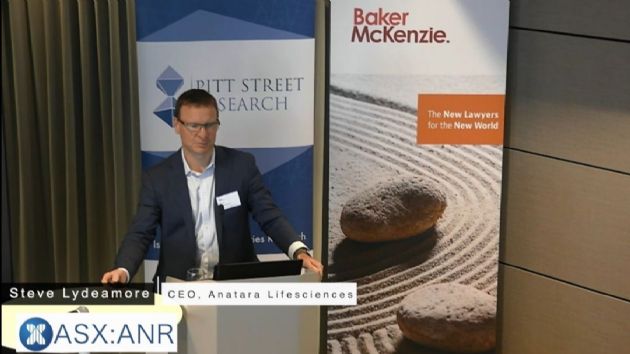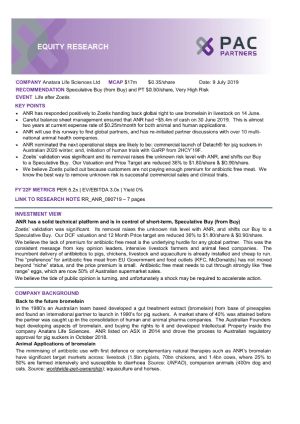
Formation of Product Development Advisory Board
Brisbane, Oct 23, 2018 AEST (ABN Newswire) - Anatara Lifesciences ( ASX:ANR), a company focused on commercialising innovative products for gut health, is pleased to announce the formation of its Product Development Advisory Board. The Advisory Board consists of five key external experts: Dr Rebecca Burgell, Dr Jakob Begun, Prof Barry Campbell, Assoc Prof Simon Keely and Prof Peter Gibson, who will serve as the Chairman.
ASX:ANR), a company focused on commercialising innovative products for gut health, is pleased to announce the formation of its Product Development Advisory Board. The Advisory Board consists of five key external experts: Dr Rebecca Burgell, Dr Jakob Begun, Prof Barry Campbell, Assoc Prof Simon Keely and Prof Peter Gibson, who will serve as the Chairman.
Key points:
- New Product Development Advisory Board includes prominent scientists:
o Prof Peter Gibson, Director of Gastroenterology, The Alfred and Monash University, Melbourne, VIC, who will serve as Chairman
o Dr Rebecca Burgell, Consultant Gastroenterologist, The Alfred and Monash University Melbourne, VIC
o Dr Jakob Begun, Clinical Lead, Mater Hospital and IBD Group Leader, Mater Research Institute, University of Queensland, Brisbane, QLD
o Prof Barry Campbell, Gastroenterology Research Unit, Department of Cellular and Molecular Physiology, Institute of Translational Medicine, University of Liverpool, UK
o Assoc Prof Simon Keely, Chief Investigator, Hunter Medical Research Institute (HMRI) Gastrointestinal Research Group, Newcastle, NSW
- The Product Development Advisory Board will guide Anatara's scientific programs and product development strategies
The newly appointed Advisory Board will work closely with the Anatara Board and management team as it continues to advance its human gastrointestinal (GI) health program, in the burgeoning gut health market. The Advisory Board will provide advice on issues relating to Anatara's research priorities and strategies, and the Company's product development programs.
Sue MacLeman, Non-Executive Chair, Board of Directors said, "We feel privileged to have attracted advisors with world-leading experience in gastrointestinal disorders to join Anatara's inaugural Advisory Board. The group will assist with guiding our scientific programs and will advise on our long-term strategic goals. Their expertise will be valuable as we look toward commercialising our first human product candidate, the Gastrointestinal Reprogramming (GaRP) dietary supplement, and to the further development of our human product pipeline."
Professor Peter Gibson will assume the role of Chairman and has more than 30 years' experience in gastrointestinal health. He is recognised globally as an expert physician and researcher and was awarded the Distinguished Research Prize by the Gastroenterological Society of Australia in 2010.
"Anatara's focus on human gastrointestinal disorders is an exciting new development in the growing gut health space. Irritable Bowel Syndrome (IBS) is a chronic condition that affects up to 15% of all Australians at some point in their life," said Professor Peter Gibson. "Together with my Advisory Board colleagues, I look forward to assisting Anatara as they develop products to assist with the debilitating symptoms associated with gastrointestinal disorders such as IBS."
Dr Tracie Ramsdale, Interim CEO and Non-Executive Director, commented, "It is a testament to the potential of Anatara's human gastrointestinal health program that we have been able to attract such prominent scientists and clinicians to our product development Advisory Board. We continue to focus on the development of our GaRP dietary supplement program, which we hope will serve to greatly assist patient wellbeing for those with gastrointestinal disorders like Inflammatory Bowel Disease and Irritable Bowel Syndrome."
She continued, "GaRP is being developed to be a multi-component dietary supplement, designed to address the primary underlying factors associated with gastrointestinal disorders, such as inflammation, a dysfunctional microbiome, impaired intestinal barrier function and mucosal damage. The advisory board will meet twice yearly, as well as when needed for specific additional purposes, as we accelerate GaRP's proof of concept studies and assess other potential product opportunities in gastrointestinal health."
Full biographies for each member of the Anatara Lifesciences Advisory Board are available below.
Professor Peter Gibson
Professor Peter Gibson is the Director of Gastroenterology at The Alfred and Monash University, having previously been Professor of Medicine at Eastern Health and Head of the Eastern Health Clinical School. He is a Past-President of the Gastroenterological Society of Australia. From a background of research in epithelial cell biology, he now directs a large program of translational research, and has active clinical interests in inflammatory bowel disease, coeliac disease and irritable bowel syndrome. A major focus of his work is the use of diet to control gut symptoms and influence outcomes in chronic intestinal conditions such as irritable bowel syndrome and inflammatory bowel disease. He has published widely on these topics. He was awarded the Distinguished Research Prize by the Gastroenterological Society of Australia in 2010.
Doctor Rebecca Burgell
Dr Rebecca Burgell is a consultant gastroenterologist with an interest in inflammatory bowel disease, clinical nutrition, pelvic floor dysfunction and functional gastrointestinal disorders. She is the Head of the Functional Gastrointestinal disorders service and medical lead of the home enteral nutrition program at Alfred Health. Dr Burgell has a PhD from the University of London examining the physiology of the lower bowel in patients with severe functional constipation at the National centre for bowel research and surgical innovation based at Bart's Health in London. She is expert in performing anorectal physiology investigations and endoanal ultrasound and is a member of the International Anorectal Physiology Working Group. Dr Burgell currently works fulltime at Alfred Health and Monash University.
Doctor Jakob Begun
Dr Jakob Begun obtained his MD and PhD in genetics at Harvard Medical School. His advanced training in Gastroenterology and Inflammatory Bowel Disease (IBD) was at Massachusetts General Hospital (MGH) where he developed a keen interest in the microbiome - immune system interactions. He returned to Australia in 2014 to pursue his interest in clinical IBD and research. He is the IBD clinical lead at the Mater Hospital Brisbane and IBD Group leader at the Mater Research Institute - University of Queensland. He runs a basic and translational laboratory investigating the interaction between innate immune functions of the gut and the microbial community. He also performs clinical research examining the natural history of IBD, endoscopic assessment and intervention, and identifying barriers of care for adolescents and young adults with IBD at the Mater Young Adult Health Centre. He serves on the steering committees of the Australia and New Zealand IBD Consortium and the Australian IBD Association.
Professor Barry Campbell
Professor Barry Campbell is a holds a professorship in University of Liverpool's Institute of Translational Medicine. Barry started his scientific career in gut endocrine physiology at UCNW Bangor, receiving a BSc with Honours in Zoology in 1988, and a PhD in Physiology from University of Liverpool in 1991. Following an MRC-funded post-doctoral research position, he held a Wellcome Trust-funded lectureship in intestinal physiology, before being appointed to a full-time academic post in Medicine at Liverpool where his research led to specific understanding of the causes and consequences of altered intestinal mucosal glycosylation that occurs in intestinal inflammation and cancer.
Professor Campbell now leads one of the key international translational research groups investigating bacteria-host intestinal epithelium interactions, particularly focused on Crohn's disease- and colorectal cancer-mucosa associated Escherichia coli. This includes laboratory studies on epithelial and immune cell responses in 2D cell-line and 3D organoid cultures, and in ex vivo tissue, and translational medicine projects examining effects of antibiotics, environment modulating agents and dietary components. He was awarded a Personal Chair within the University of Liverpool's Institute of Translational Medicine in 2013. He is a member of the UK Gut Microbiota for Health Expert Panel and the 'Scientists in Gastroenterology' lead for the British Society of Gastroenterology, supporting education, research and the annual meeting Translational Science Masterclass symposia.
Associate Professor Simon Keely
Dr Keely is chief investigator of the Hunter Medical Research Institute (HMRI) Gastrointestinal Research Group. Dr Keely graduated with a Ph.D. from University College Dublin. He undertook postdoctoral research training at the Mucosal Inflammation Program in University of Colorado Denver, receiving a prestigious fellowship from the Crohn's and Colitis Foundation of America. His research group at the HMRI is a multidisciplinary team of biomedical and clinician researchers investigating the molecular mechanisms of gastrointestinal diseases such as inflammatory bowel disease, colorectal cancer and functional GI disorders. Dr Keely is particularly interested in understanding changes in both tissue metabolism and host-microbe interactions during mucosal inflammation and how these changes relate to GI immunopathology and loss of immune homeostasis. The ultimate goal of this research is to understand how these factors can be manipulated for therapeutic benefit. Dr Keely has specialist expertise in in vitro, ex vivo and in vivo models of IBD and IBS. His work been published in leading gastroenterology and basic laboratory science journals and he is a consultant for a number of pharmaceutical companies.
About Anatara Lifesciences Limited
 Anatara Lifesciences Limited (ASX:ANR) is developing and commercialising innovative, evidence-based products for gastrointestinal health where there is significant unmet need. Anatara is a life sciences company with expertise in developing productsfor human and animal health. Anatara is focused on building a pipeline of human gastrointestinal health products. Underlying this product development program is our commitment to delivering real outcomes for patients and strong value for our shareholders.
Anatara Lifesciences Limited (ASX:ANR) is developing and commercialising innovative, evidence-based products for gastrointestinal health where there is significant unmet need. Anatara is a life sciences company with expertise in developing productsfor human and animal health. Anatara is focused on building a pipeline of human gastrointestinal health products. Underlying this product development program is our commitment to delivering real outcomes for patients and strong value for our shareholders.
| ||
|













